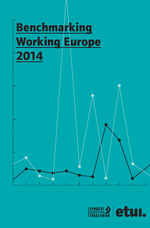Conti, N. (ed.) (2014) “Party Attitudes towards the EU in the Member States – Parties for Europe, Parties against Europe“, Routledge Advances in European Politics, Routledge Publications: United Kingdom. In a moment where the EU is facing an important number of challenges, there is growing interest in understanding how parties influence the way Europe evolves as a political issue, notably how parties structure domestic competition over European issues and …Read More
How to save bank resolution in the European banking union
Gordon, N. J. & Ringe, G. (2014) “How to save bank resolution in the European banking union“, VoxEU Organisation, 30 Απριλίου. The European Parliament recently adopted the Single Resolution Mechanism. Though supposed to be a pillar of the European banking union, it is fraught with difficulties. This column makes a proposal for a new organisational structure that can deal with bank failure more effectively. European banks should be required …Read More
The rise of Euroscepticism across Europe has masked general apathy about the European elections among voters
McDonnell, D. (2014) “The rise of Euroscepticism across Europe has masked general apathy about the European elections among voters“, LSE EUROPP, 29 Απριλίου. Marine Le Pen’s Front National and Geert Wilders’ Party for Freedom have announced that they intend to form a ‘Eurosceptic alliance’ in the European Parliament after the 2014 European elections. Duncan McDonnell writes that while the overall picture in the European elections will see Eurosceptic parties …Read More
Europe’s Trapped Politics
Pisani-Ferry, J. (2014) “Europe’s Trapped Politics”, Project Syndicate, 29 Απριλίου. PARIS – When the last European Parliament election was held, in 2009, it seemed that Europe’s citizens were all facing the same dangers. Across the continent, governments were busy coping with the consequences of the global crisis that had erupted the year before. Five years later, on the eve of another European Parliament election, the situation could not be …Read More
Benchmarking Working Europe 2014
ETUI (2014) “Benchmarking Working Europe 2014“, European Trade Union Institute (ETUI) Report, 29 Απριλίου. The year 2010 saw the launch of the Europe 2020 strategy. The new EU strategy had been devised for the purpose of promoting smart, sustainable and inclusive growth that would help Europe recover from the crisis and re-emerge stronger and more prosperous on the other side. In June of the same year, the European Semester …Read More
Bureaucracy may be the solution, rather than the problem, for issues of European governance
Lodge, M. & Wegrich, K. (2014) “Bureaucracy may be the solution, rather than the problem, for issues of European governance“, LSE EUROPP, 24 Απριλίου. The European Union is often criticised from the perspective that it has created a layer of bureaucracy or ‘red tape’ which has a damaging effect on European governance. Martin Lodge and Kai Wegrich write that while it is particularly common for political parties to make …Read More
European Banking Union: Status of Implementation and the Need for Improvement
Bauer, M. & Demary, M. (2014) “European Banking Union: Status of Implementation and the Need for Improvement“, Konrand Adenauer Stiftung, 23 Απριλίου. The crisis in the euro area revealed points of weakness in the architecture of the Monetary Union. It appeared that the common monetary policy also required a common system of banking supervision. This report summarises the current proposals and decisions regarding the Banking Union and evaluates the …Read More
Is German Policy The Greatest Eurozone Threat? A Response To Jürgen Stark
Fazi, T. (2014) “Is German Policy The Greatest Eurozone Threat? A Response To Jürgen Stark“, Social Europe Journal, 16 Απριλίου. In a recent article published in the Financial Times, Jürgen Stark, a former member of the ECB’s executive board, brings the anti-inflation paranoia that the German establishment has accustomed us to since the start of the crisis to a whole new level. In his commentary, he rebuts the need …Read More
European Banking Union: Current Outlook and Short-Term Choices
Véron, N. (2014) “European Banking Union: Current Outlook and Short-Term Choices”, Statement presented at the conference “Banking Union and the Financing of the Portuguese Economy,” Assembleia da Republica/ Portuguese Parliament, Lisbon, 26 Φεβρουαρίου. The launch of Europe’s banking union on June 29, 2012, was arguably the European Union’s most consequential policy initiative since the start of its financial crisis in mid-2007. Banking union, defined as the transfer of banking …Read More
The German Leadership Question
Issing, O. (2014) “The German Leadership Question”, Project Syndicate, 14 Απριλίου. FRANKFURT – Many in the eurozone’s crisis countries complain that the source of their suffering is a rigid economic-austerity regime – including reductions in wages and pensions, tax increases, and soaring unemployment – imposed on them by Germany. Hostility against Germany has reached a level unseen in Europe since the end of World War II. And yet, despite …Read More





